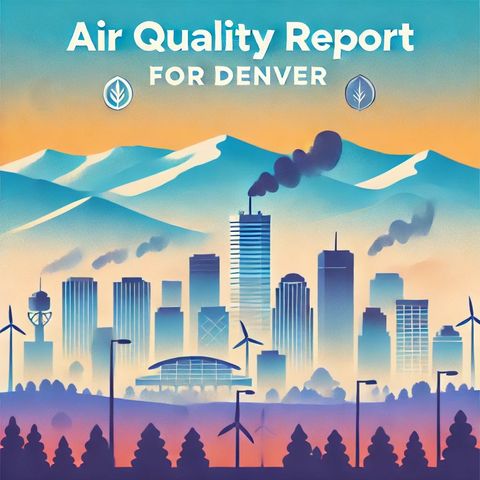Denver's Air Quality Fluctuates Amid Pollution Concerns

Scarica e ascolta ovunque
Scarica i tuoi episodi preferiti e goditi l'ascolto, ovunque tu sia! Iscriviti o accedi ora per ascoltare offline.
Descrizione
As of today, Denver's air quality is a critical topic of concern for both residents and environmental agencies. Denver, known for its picturesque landscapes and vibrant urban life, often experiences...
mostra di piùToday, the Air Quality Index, or AQI, for Denver is a moderate 65. The AQI is a standardized tool used by environmental agencies to quantify and communicate the quality of the air. It ranges from 0 to 500, where lower values indicate better air quality and higher values signify more pollution and potential health concerns. An AQI of 65 suggests that the air quality is acceptable; however, there may be a moderate health concern for a very small number of people who are unusually sensitive to air pollution.
The primary pollutants contributing to today's air quality index are ground-level ozone and particulate matter, known as PM2.5. Ground-level ozone is typically a greater concern during the warmer months as it forms when sunlight reacts with pollutants like vehicle emissions. While currently at moderate levels, it can irritate the respiratory system, especially for vulnerable groups such as children and individuals with pre-existing health conditions.
Particulate matter, especially PM2.5, refers to tiny particles in the air that can penetrate the lungs and even enter the bloodstream, posing various health risks. The presence of PM2.5 in today's air quality readings can be attributed to ongoing construction activities, vehicle emissions, and residual effects from regional wildfires that have been impacting the Western United States.
The weather also plays a significant role in today's air quality. Denver is experiencing clear skies with moderate temperatures. This weather pattern typically helps disperse pollutants, preventing them from accumulating in the atmosphere. However, temperature inversions, a phenomenon where warmer air traps cooler air near the ground, can sometimes lead to higher pollution levels by preventing the dispersion of pollutants.
Denver residents are encouraged to stay informed about air quality levels through local news sources and environmental agencies. For those sensitive to air pollution, it is advisable to limit outdoor exertion during peak pollution times, usually in the afternoon and early evening. Additionally, utilizing public transport and reducing the use of vehicles can contribute to healthier air quality standards for the community.
Overall, while today's air quality in Denver is moderate, being vigilant and proactive can help mitigate health effects and contribute to long-term improvements. Promoting sustainable practices and increasing awareness about air pollution is crucial in ensuring a cleaner and safer environment for future generations.
Informazioni
| Autore | QP-5 |
| Organizzazione | William Corbin |
| Sito | - |
| Tag |
Copyright 2024 - Spreaker Inc. an iHeartMedia Company

Commenti